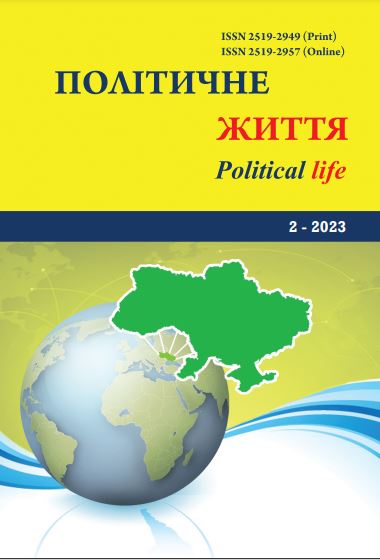Basic principles of formation of China’s foreign policy
DOI:
https://doi.org/10.31558/2519-2949.2023.2.14Keywords:
China; foreign policy; international relationsAbstract
The article examines the main principles of the formation of China’s foreign policy and the strategy of modernization of society, which should be implemented in three stages. It is established that a significant role in the formation of China’s early foreign policy concepts was played by the geopolitical factor, which manifested itself against the background of the Asian regional conflicts of the second half of the 20th century. The Soviet factor had a significant influence on the formation of China’s foreign policy. Chinese political leaders tried to build the People’s Republic of China according to the wills of the USSR, but with some national specificity.
The main manifestations and consequences of changes in foreign policy orientations in China’s foreign policy since the 19th century have been identified.
It has been studied that China’s foreign policy is in the process of transformation and departure from the ideas of Deng Xiaoping and the support of a suitable external environment, the key elements of which are: market opening, institutional innovations, development of mutually beneficial relations with various countries, active participation in global processes to ensure strategic balance and stability in the regions.
Normative legal acts on the formation of China’s foreign policy are analyzed. After the proclamation of the People’s Republic of China in 1949, the country’s Constitution was changed four times, which in turn determined China’s foreign policy course.
The conclusions state that the main principles of China’s foreign policy are: peaceful coexistence, that is, mutual respect for sovereignty and territorial integrity, mutual non-aggression, non-interference in each other’s internal affairs, equality and mutual benefit.
References
Bates G. China Matters: Getting it Right for Australia. Melbourne: Black Ins/La Trobe. 2017
(дата звернення: 02.06.2023).
Зовнішня політика Китаю. URL: https://studies.in.ua/mvidn_seminar/1199-zovnshnya-poltika-kitayu.html (дата звернення: 04.06.2023).
Кречетніков А. Корейська війна: ще одна загадка Сталіна – ВВС. 2013.
URL: https:// www.bbc.com/ukrainian/politics/2013/07/130726_korean_war_ag (дата звернення: 04.06.2023).
Омельченко В. Велика гра КНР за глобальне лідерство: історичні корені, сучасні інструменти, майбутні наслідки. Центр Разумкова. 2023. URL: https://razumkov.org.ua/statti/ velyka-gra-knr-za-globalne-liderstvo-istorychni-koreni-suchasni-instrumenty-maibutni-naslidky (дата звернення 05.06.2023).
Конституція Китайської Народної Республіки.
URL: https://uk.wikipedia.org/wiki/ Конституція_Китайської_Народної_Республіки (дата звернення 06.06.2023).
Лікарчук Д. С. Зовнішня політика Китаю: конфлікти, перспективи, нові сценарії. Науковий журнал ДВНЗ «Ужгородський національний університет» Регіональні студії. Ужгород. 2021. № 25. Стор. 27-28.

